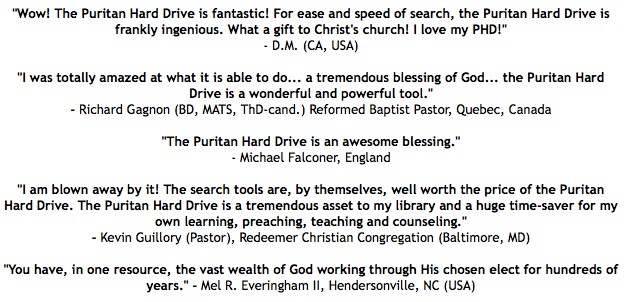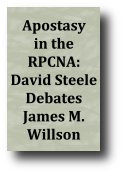 Loading... Please wait...
Loading... Please wait...- SWRB Home
-
Free Resources
- Short Listings Of Free Reformation & Creation Resources
- Free Reformed, Puritan, Covenanter and Creationist Videos
- Thousands of Links to Free Audio, Video and Printed Resources
- Free Puritan Books, Reformed MP3s, and Calvinist Videos
- Puritan Quotes, Free Reformation MP3s, Reformed Books and Calvinist Videos From PuritanDownloads.com On FaceBook
- Shipping & Returns
- Blog
- Privacy Policy
- Contact Us
- Payment Options
- Help
-
About Us
- Sitemap
Pastor Scott Brown, on the left in the video above, is the Director of the National Center for Family-Integrated Churches (NCFIC)
Resource Categories
- PURITAN HARD DRIVE REVIEWS
- PASTOR ROB VENTURA ON THE PURITAN HARD DRIVE
- DR. VODDIE BAUCHAM, JR. ON THE PURITAN HARD DRIVE
- R. C. SPROUL ON SWRB
- DR. JOEL R. BEEKE ON THE PURITAN HARD DRIVE
- PASTOR GREG L. PRICE ON THE PURITAN HARD DRIVE
- DR. MATTHEW MCMAHON ON THE PURITAN HARD DRIVE
- PASTOR SCOTT BROWN ON THE PURITAN HARD DRIVE
- PASTOR W. J. MENCAROW ON THE PURITAN HARD DRIVE
- JOAQUIN FERNANDEZ ON THE PURITAN HARD DRIVE
- PASTOR DAVID SILVERSIDES ON THE PURITAN HARD DRIVE
- JOHN HENDRYX ON THE PURITAN HARD DRIVE
- PASTOR KEVIN GUILLORY ON THE PURITAN HARD DRIVE
- RICHARD BENNETT ON THE PURITAN HARD DRIVE
- DR. KENNY RHODES ON THE PURITAN HARD DRIVE
- JUSTIN RAWSON ON THE PURITAN HARD DRIVE
- PASTOR JAMES WALLACE ON THE PURITAN HARD DRIVE
- PASTOR RICHARD GAGNON ON THE PURITAN HARD DRIVE
- PASTOR JOE HAYNES ON THE PURITAN HARD DRIVE
- DR. STEVEN DILDAY ON THE PURITAN HARD DRIVE
- PASTOR ANDREW COMPTON ON THE PURITAN HARD DRIVE
- TERENCE ELLARD ON THE PURITAN HARD DRIVE
- PASTOR JERRY JOHNSON ON THE PURITAN HARD DRIVE
- PASTOR DAVID PETRIE ON THE PURITAN HARD DRIVE
- JIM DODSON ON THE PURITAN HARD DRIVE
- PASTOR BRIAN SCHWERTLEY ON THE PURITAN HARD DRIVE
- PASTOR PHIL GIBSON ON THE PURITAN HARD DRIVE
- MEL R. EVERINGHAM II ON THE PURITAN HARD DRIVE
- PAUL BLYTH ON THE PURITAN HARD DRIVE
- STEVE KETTLER ON THE PURITAN HARD DRIVE
- D. M. (CALIFORNIA) ON THE PURITAN HARD DRIVE
- MICHAEL CAUGHRAN ON THE PURITAN HARD DRIVE
- WIILIAM NOPPER IV ON THE PURITAN HARD DRIVE
- LINDA THERIAULT ON THE PURITAN HARD DRIVE
- WILLIAM WARNOCK ON THE PURITAN HARD DRIVE
- ROBERT KOH ON THE PURITAN HARD DRIVE
- WHAT'S ON THE PURITAN HARD DRIVE?
- ALL PURITAN HARD DRIVE VIDEOS
- PHD-ODE INSTALLATION VIDEOS
- COMMENTS ON SWRB
- ALL PURITAN QUOTE VIDEOS
- PURITAN HARD DRIVE SCREENSHOTS
- PURITAN HARD DRIVE MINISTRY AND DONATION OFFERS
- TABLE OF RESOURCE CATEGORIES
- Advanced Studies
- SWRB SERMONAUDIO MOBILE APP
- Apologetics
- Assurance
- Attributes and Holiness of God
- Augustine
- Banner of Truth
- Baptism
- Beginners
- Bibles (Geneva, KJV, Hexapla, etc.)
- Biblical Counseling
- BIBLICAL HD COLLECTION
- Biblical Interpretation (Hermeneutics)
- Biographies and Autobiographies
- Calvinism and the Sovereignty of God
- CALVINISM HD COLLECTION
- CALVINIST CLASSICS HD COLLECTION
- Charles Spurgeon
- Children's Books
- CHRISTIAN EDUCATION HD COLLECTION
- Christian History
- Church Government
- Civil Government and Resistance
- CLASSIC CHRISTIAN HD COLLECTION
- Classic Puritan and Reformed Sets
- Commentaries
- Contemporary Issues
- Covenant Theology and Covenanting
- COVENANTER HD COLLECTION
- Covenanters and Covenanted Reformation
- Creation and Creationism
- Creeds, Confessions and Covenants
- Cults, False Religions, Psychology, Humanism
- Dealing with Affliction, Suffering, and Sickness
- Debates
- Dutch Reformed
- Education and Home Schooling
- English Puritans, Covenanters and Reformers
- Family, Children, Home, and Family Worship
- First Reformation
- Five Points of Calvinism (TULIP)
- For Pastors and Elders
- For Seminary Students
- FREE PURITAN & REFORMATION MP3 AUDIO SERMONS/BOOKS
- FREE PURITAN BOOKS, REFORMATION MP3s, PDFs, VIDEOs
- George Gillespie
- God's Law, The Ten Commandments, etc.
- Greg L. Price on Headcoverings
- Heaven, Hell and the Final Judgment
- Holy Days (Lord's Day, Christmas, Easter, etc.)
- HOME SCHOOL HD COLLECTION
- Intermediate Studies
- John Bunyan
- John Calvin
- John Knox
- John Owen
- Jonathan Edwards
- Justification
- Languages, Dictionaries, Reference, etc.
- LOOK WHO LOVES THE PURITAN HARD DRIVE
- Lord's Supper (Communion)
- Marriage, Courtship, etc.
- Martin Luther and Lutheranism
- Martyrs and Persecution
- Other Protestant Works
- Predestination and Providence
- PRESBYTERIAN HD COLLECTION
- Presbyterians and Presbyterianism
- Prophecy, Antichrist, and Eschatology
- PROTESTANT HD COLLECTION
- PSALM SINGING MP3s (COMPLETE SET)
- Psalters, Psalm Singing and Music
- Puritan Facts
- PURITAN FAST SERMONS (1640-1653) - 34 VOLS SET
- Puritan Fast Sermons 1640-1653
- Puritans and Puritanism
- PURITAN HARD DRIVE
- REFORMATION HD COLLECTION
- Reformation History
- Reformed and Puritan Classics
- Reformed Baptist
- REFORMED BAPTIST HD COLLECTION
- REFORMED HD COLLECTION
- REFORMED PRESBYTERIAN HD COLLECTION
- Reformed Presbytery, RPNA Protesters, etc.
- Reformed Theology
- Reformed Worship, The Regulative Principle, etc.
- Roman Catholicism, the Jesuits, Islam, etc.
- Salvation and Evangelism
- Samuel Rutherford
- Sanctification, Prayer and Holiness
- Scottish Covenanters
- Scottish Presbyterianism
- Scripture Song MP3s (Psalms and Bibles Verses)
- Second Reformation
- Separation, Unity, Uniformity, etc.
- Sermons and Sermon Collections
- Solemn League and Covenant
- Theology and Doctrine
- Third Reformation
- Thomas Watson
- Westminster Confession, Assembly and Divines
- Authors (All A to Z)
Phone Orders:
(780) 450-3730
To obtain free Reformation books, Puritan MP3s and Calvinistic videos, SWRB discount coupons, etc., add yourself to SWRB's Puritan and Reformed email list by using the form above.
Apostasy in the RPCNA: David Steele Debates James M. Willson by David Steele
Resource Details
Resource Description
This debate took place in 1856 in the Covenanter magazine (edited by James M. Willson), with Steele's final response appearing in the Reformed Presbyterian magazine in 1857. In the course of this debate Steele shows how "Reformation Principles Exhibited" -- part of the RPCNA's subordinate standards from 1806 to 1979 -- "necessarily subverts the Covenanted Reformation."
This debate is also useful in that it shows that our modern malignants (like Richard Bacon, pastor of First Presbyterian Church, Rowlett TX and Doug Wilson [Credenda Agenda magazine]), who continue to attack Steele, either do not understand what he has said, or, even worse, have libelled him without reading his work.
Steele's exchange with Willson is especially instructive concerning Steele's views of historical testimony, subordinate standards, terms of communion, and sola scriptura -- which were simply the views of the best classical Protestants of the First and Second Reformations. The treatment Steele received from Willson was not surprising, and is the same the Puritan Reformed Church of Edmonton has received from neopresbyterians like Bacon and Doug Wilson in our day.
As Bacon and Willson have with the Puritan Reformed Church of Edmonton, Willson accused Steele of being Popish by requiring uninspired historical testimony as a term of communion. Steele deftly parried this slander, pointing out that by claiming infallibility for humanly composed doctrinal statements simply because they agreed with the Word of God (which makes them subordinate, not infallible), it was in fact Willson who made himself obnoxious to the charge of Popery.
Steele insisted,
"But if we 'cannot swear to the truth of history,' what is the reason? We assume that the only reason having the shadow of plausibility is this, we cannot be sure that the history is infallibly true. Well, then, if we can swear to the truth of doctrine [as we do in vowing to uphold Confessions of Faith -- RB], the reason must be, because we are sure of its infallibility (i.e. taken in context Steele is pointing out that what we swear to uphold must be without error -- though yet capable of improvement -- as his quote below proves -- RB)."
Willson replied, to his shame, "Certainly, 'infallible' because Bible truth." Steele's position against the scurrilous, unscholarly and simplistic attacks against him, regarding the false charges of popery, are also refuted in his Reminiscences, where he writes,
"Let no one imagine that I defend symbols of faith from the force of habit, or because they are old, perfect, immutable or infallible; for I have for may years repeatedly said the contrary: that no document framed by the wisdom, learning, or piety of any uninspired man, or body of such, is either perfect or immutable, and much less infallible.
But alas! most of those who cry loudest for liberty and against what they call 'fetters of intellect,' etc., make the nearest approach to the blasphemous claims of apostate Rome to infallibility. Only put the majority in the Pope's place, and any change of standards or innovation must be right, however unscriptural or irrational. No, I plead not for the immutability, but for the faithfulness of subordinate standards, both of doctrine and practice... all true progress consists in conformity of the Bible" (pp. 135-136, 196).
Additionally, please note that contrary to false reports that have been circulated by a few unscrupulous schismatics (Richard Bacon, Christ Coldwell, et al.) we have never called the RPCNA (Reformed Presbyterian Church in North America) "apostate." That is, we have never said that the RPCNA has degenerated so far as not to be considered a church in any sense. We do consider there to be a visible church, as to being (esse), in the RPCNA. However, we have clearly testified -- and will, by God's grace continue to do so -- to the apostasy (or falling away from biblical Reformation) in the RPNCA.
As there are varying degrees of faithfulness, heresy, etc., so are there varying degrees of apostasy (i.e. falling away). By this we mean that the RPCNA, as a body (based on her corporate public testimony), has fallen away from the truth to such an extent that they now lack the lawful form of the visible church (cf. Calvin's Institutes 4.2.12). They are no longer a church as to "well-being" (bene esse; compare WCF 25:2 [which deals with the "being" of the visible church] with WCF 25:3 [which deals with the "well-being" of the visible church]).
Our duty, as Christians, in such cases is clear, "Now we command you, brethren, in the name of our Lord Jesus Christ, that ye withdraw yourselves from every brother that walketh disorderly, and not after the tradition which he received of us" (2 Thes. 3:6). "Now I beseech you, brethren, mark them which cause divisions and offences contrary to the doctrine which ye have learned; and avoid them" (Rom. 16:17).
When Samuel Rutherford (and the other Protesting Covenanters) refused to serve the Lord's Supper to the backsliding Resolutioners (unfaithful Covenanters) and testified against and refused to attend their pretended assemblies, (and the Resolutioners were far more faithful then than the RPCNA, OPC, PCA, etc., are today), the Protesters were simply maintaining the classic Reformation position on the visible church and biblical separation.
On the basis of Scripture they did as we are doing today -- recognizing the crucial distinction between the "being" and "well being" of the visible church and the fundamental distinction between the church in a "settled state" versus the church in a "broken state" (and these basic distinctions permeate the writings of all the best Reformers on the church). Incidentally, ignoring (or ignorance of) these two crucial distinctions is the reason why so many people confuse the positions taken in Samuel Rutherford's writings (e.g. they misapply Rutherford's words referring to the church in a "settled state" to the church in an "unsettled" (or broken) state; thus, making Rutherford's actions in the Protester/Resolutioner controversy contradict his own writings).
Thus, it can easily be seen that in his day David Steele faithfully resisted many of the same innovations that our Protesting fathers (like Rutherford, Guthrie, Renwick, etc.) resisted against the apostatizing Resolutioners (and apostate Papists and Prelates). For this, he was slandered and ostracized, "choosing rather to suffer affliction with the people of God, than to enjoy the pleasures of sin for a season; esteeming the reproach of Christ greater riches" than accepted status in a whorishly backsliding church. Sadly, even with her declension in the mid-1800's, the RPCNA then looks pristine when compared with the RPCNA today.
May God use this debate to reclaim many dear brethren in that dangerously deformed and deforming body!
(N.B. Even as Steele did with Willson, Greg Barrow has exposed the Popery -- and Independency, Arminianism, and other egregious errors -- in Richard Bacon's confused and malicious attacks on modern Covenanters in his, The Covenanted Reformation Defended Against Contemporary Schismatics [free at: http://www.swrb.com/newslett/actualnls/CovRefGB.htm or as a photocopy].
The reader would also do well to consult Steele's, The Two Witnesses (which is available from SWRB.).
All resources for sale on this website, with the exception of Scottish Metrical Psalms MP3s, are available on the Puritan Hard Drive .
VIDEO INTRODUCTION TO THE PURITAN HARD DRIVE


Phone Orders:
(780) 450-3730
To obtain free Reformation books, Puritan MP3s and Calvinistic videos, SWRB discount coupons, etc., add yourself to SWRB's Puritan and Reformed email list by using the form above.








































